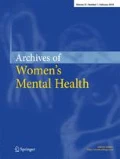Abstract
Controversy regarding psychological or psychiatric outcomes following hysterectomy still exists. The purpose of this study was to investigate the risk of postoperative psychiatric disorders in women with hysterectomy compared to that in women with uterus-conserving surgery for myomas by using population-based data from South Korea. This study was designed as a retrospective cohort study. We analyzed the National Health Insurance Service National Sample Cohort data including all administrative medical claims from 2002 to 2013. The study population, consisting of 9581 women, was defined as those diagnosed with uterine myoma who underwent medical procedures. The association between psychiatric and mood disorders and hysterectomy was assessed using Cox proportional hazard regression. During the study period, 1381 (14.4%) women experienced psychiatric disorders and 374 (3.9%) experienced mood disorders. The hazard ratio (HR) for psychiatric disorder was higher in women after hysterectomy than in women after uterus-conserving procedures (adjusted HR = 1.44; 95% CI = 1.27–1.64, p < 0.0001). In addition, the HR for mood disorders in women after hysterectomy was significantly higher than in women after uterus-conserving procedures (adjusted HR = 1.62; 95% CI = 1.26–2.08, p = 0.0002). Our study suggests that hysterectomy increased the risk of psychiatric disorders compared to uterus-conserving procedures in women with uterine myoma. Considering these findings, more focus on psychological responses in women following hysterectomy is needed, and appropriate psychosocial support or provisioning of information before or after procedures could reduce psychological distress.


Similar content being viewed by others
References
Bahri N, Tohidinik HR, Najafi TF, Larki M, Amini T, Sartavosi ZA (2016) Depression following hysterectomy and the influencing factors. Iranian Red Crescent Medical Journal 18(1):e30493
Choi J-H, Kim J-K (2010) Influences of health-related factors on uterine myoma. J Korea Contents Assoc 10(1):325–333
Chou P-H, Lin C-H, Cheng C, Chang C-L, Tsai C-J, Tsai C-P et al (2015) Risk of depressive disorders in women undergoing hysterectomy: a population-based follow-up study. J Psychiatr Res 68:186–191
Darwish M, Atlantis E, Mohamed-Taysir T (2014) Psychological outcomes after hysterectomy for benign conditions: a systematic review and meta-analysis. European Journal of Obstetrics & Gynecology and Reproductive Biology 174:5–19
Farquhar CM, Harvey SA, Yu Y, Sadler L, Stewart AW (2006) A prospective study of 3 years of outcomes after hysterectomy with and without oophorectomy. Am J Obstet Gynecol 194(3):711–717
Gibson CJ, Joffe H, Bromberger JT, Thurston RC, Lewis TT, Khalil N et al (2012) Mood symptoms after natural menopause and hysterectomy with and without bilateral oophorectomy among women in midlife. Obstet Gynecol 119(5):935–941
Helmy YA, Hassanin IM, Elraheem TA, Bedaiwy AA, Peterson RS, Bedaiwy MA (2008) Psychiatric morbidity following hysterectomy in Egypt. Int J Gynecol Obstet 102(1):60–64
Kim YM (2015) Treatment of uterine leiomyoma: how to choose a therapeutic method? J Korean Med Assoc 58(12):1147–1153
Kim C-H, Kim S-R, Lee H-A, Kim S-H, Chae H-D, Kang B-M (2011) Transvaginal ultrasound-guided radiofrequency myolysis for uterine myomas. Hum Reprod 26(3):559–563
Korea National Health Insurance Service (2015) The statistical yearbook of major surgery in 2014
Korea Society for Curriculum of Women's Health Nursing (2007) Women’s health nursing care Soomoonsa
Korea Society of Obstetric and Gynecology (2007) Gynecology: Korea Medical Book Publisher
Kugaya A, Epperson CN, Zoghbi S, van Dyck CH, Hou Y, Fujita M et al (2003) Increase in prefrontal cortex serotonin2A receptors following estrogen treatment in postmenopausal women. Am J Psychiatr 160(8):1522–1524
Lee HJ, Park HS, Kim NH (2009) Gender role identity and quality of life of hysterectomy women receiving hormone replacement therapy. Korean J Women Health Nurs 15(4):320–327
National Health Insurance Policy Research Institute (2015) The results from analysis of health insurance payments
Özdamar S, Ülger H, Sorkun HC, Müderris I (2005) Effects of hysterectomy on ovarian morphology and serum FSH level in rats. Maturitas 52(1):60–64
Persson P, Brynhildsen J, Kjølhede P (2010) A 1-year follow up of psychological wellbeing after subtotal and total hysterectomy—a randomised study. BJOG Int J Obstet Gynaecol 117(4):479–487
Rannestad T (2005) Hysterectomy: effects on quality of life and psychological aspects. Best practice & research Clinical obstetrics & gynaecology 19(3):419–430
Sabry M, Al-Hendy A (2012) Medical treatment of uterine leiomyoma. Reprod Sci 19(4):339–353
Sehlo MG, Ramadani H (2010) Depression following hysterectomy. Curr Psychiatr Ther 17(2):1–6
Sundararajan V, Henderson T, Perry C, Muggivan A, Quan H, Ghali WA (2004) New ICD-10 version of the Charlson comorbidity index predicted in-hospital mortality. J Clin Epidemiol 57(12):1288–1294. doi:10.1016/j.jclinepi.2004.03.012
Vandyk AD, Brenner I, Tranmer J, Van Den Kerkhof E (2011) Depressive symptoms before and after elective hysterectomy. J Obstet Gynecol Neonatal Nurs 40(5):566–576
Vilos GA, Allaire C, Laberge P-Y, Leyland N, Vilos AG, Murji A et al (2015) The management of uterine leiomyomas. J Obstet Gynaecol Can 37(2):157–178
Vomvolaki E, Kalmantis K, Kioses E, Antsaklis A (2006) The effect of hysterectomy on sexuality and psychological changes. The European Journal of Contraception & Reproductive Health Care 11(1):23–27
Acknowledgements
This research did not receive any specific grant from funding agencies in the public, commercial, or not-for-profit sectors.
Author information
Authors and Affiliations
Corresponding author
Ethics declarations
This study was approved by the Institutional Review Board, Yonsei University Graduate School of Public Health (2014-239). This study did not need informed consent from the patients because the patients’ information was anonymized and de-identified prior to analysis.
Conflict of interest
The authors declare that they have no competing interest.
Rights and permissions
About this article
Cite this article
Lee, H.J., Kim, S.J. & Park, EC. Psychiatric outcomes after hysterectomy in women with uterine myoma: a population-based retrospective cohort study. Arch Womens Ment Health 20, 487–494 (2017). https://doi.org/10.1007/s00737-017-0745-6
Received:
Accepted:
Published:
Issue Date:
DOI: https://doi.org/10.1007/s00737-017-0745-6




